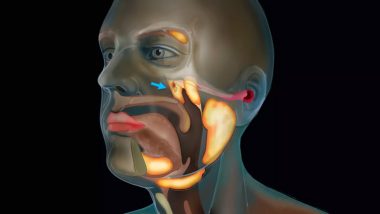Researchers at the Netherlands Cancer Institute have discovered a potential new organ in the human throat while researching on prostate cancer. The scientists have identified a set of salivary glands deep in the upper part of the throat. They have named them “tubarial salivary glands” which are hidden in our skulls where the nasal cavity and throat meet. Until now, there were three known large salivary glands in humans of which one is located under the tongue, one under the jaw and one at the back of the jaw, behind the cheek. Scientists were studying prostate cancer cells using PSMA PET-CT technology — a combination of CT scans and positron emission tomography (PET) to understand salivary gland tissues, where they found the new organ. Prostate Awareness Month 2020: Types of Prostate Exams and Signs of Cancer That You Should Know of!
According to a study published in the journal Radiotherapy and Oncology, the researchers confirmed the presence of the glands. They examined at least 100 patients to confirm about the glands. The discovery may be important for cancer treatment. Until now, this nasopharynx region, located behind the nose was thought to only have microscopic, diffuse and salivary glands. The study published in the journal Radiotherapy and Oncology says, "These findings support the identification of the tubarial glands as a new anatomical and functional entity."
The newly discovered glands are about 3.9 cms in length on average. LiveScience reported that they are located over a piece of cartilage called the torus tubarius. According to the researchers, the glands probably play the role of lubricating and moisten the upper throat behind the nose and mouth. One Way to Prevent Cancer: Map the Fundamentals of How Cells Go Awry.
Know More About Tubarial Salivary Glands Discovery:
Study co-author and Netherlands Cancer Institute radiation oncologist Wouter Vogel said in a statement, "Beyond those, perhaps a thousand microscopic salivary glands are scattered throughout the mucosal tissue of the throat and mouth. So, imagine our surprise when we found these." The authors said their discovery had clinical implications for patients with head and neck cancer and those with tumours in the throat or tongue. Radiotherapy can damage salivary glands, which can lead to dry mouth and trouble swallowing, speaking and eating.
Vogel added, "For most patients, it should technically be possible to avoid delivering radiation to this newly discovered location of the salivary gland system in the same way we try to spare known glands. Our next step is to find out how we can best spare these new glands and in which patients. If we can do this, patients may experience less side effects which will benefit their overall quality of life after treatment."
(The above story first appeared on LatestLY on Oct 22, 2020 01:27 PM IST. For more news and updates on politics, world, sports, entertainment and lifestyle, log on to our website latestly.com).













 Quickly
Quickly


